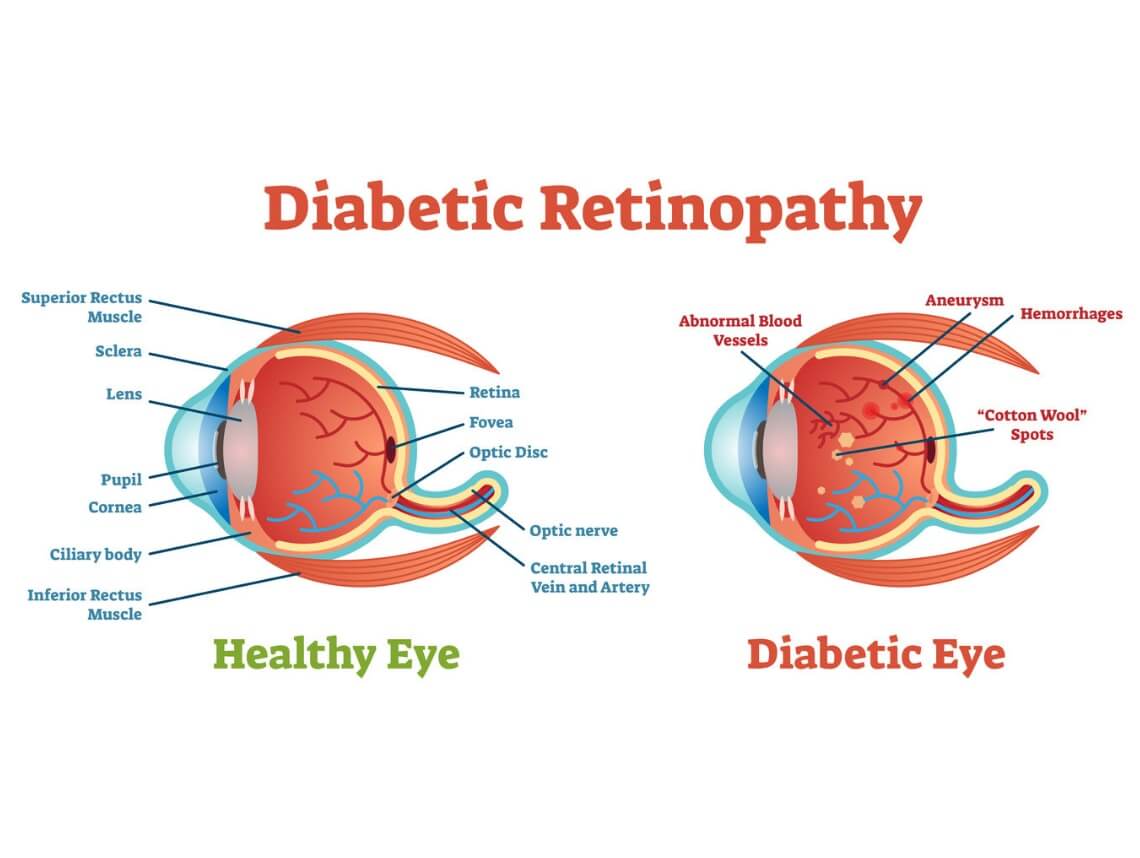By Dr. Eleanor Siri, Therapeutic Optometrist.
Diabetic eye disease is a group of eye problems that can affect people with diabetes. These conditions include diabetic retinopathy, diabetic macular edema, cataracts, and glaucoma.
Over time, diabetes can cause damage to your eyes that can lead to poor vision or even blindness.
Dr Eleanor Siri, Therapeutic Optometrist joined us on Women Fitness to answers FAQ’s on diabetic eye disease. Read on,

Q1. When does a diabetic patient begin to show effect on the eyes? What Sugar level is critical that can lead to damaging effects on the eye?
There are a couple of factors that contribute to increased risk of developing diabetic eye disease;
- Type of diabetes: Type 1 diabetics are more likely to develop eye disease in subsequent years than type 2 diabetics.
- Number of years since diagnosis: The longer you are diabetic, the higher the prevalence of developing diabetic eye disease:
- Type 1 diabetes: risk increases approximately 5 years after a diagnosis. Then after 15 years of having diabetes, 98% will have some degree of retinal damage.
- Type 2 diabetes: retinopathy may already be present at time of diagnoses. Then after 15 years of having diabetes, 78% will have some degree of retinal damage.
- Gestational diabetes: higher risk for developing retinopathy.
- Blood sugar levels & A1C
Q2. Early Signs of developing Diabetic retinopathy?
In the early stages of the disease, patients are usually asymptomatic even though eye doctors may start to see blood hemorrhages in the back of the eye during an eye examination.
Q3. List Other Eye Problems Related to Diabetes, name & short brief?
- Cataracts: Diabetics are 2 to 5 times more likely to develop cataracts at a younger age than others without diabetes.
- Open angle glaucoma: Diabetes nearly doubles your risk of developing open angle glaucoma.
- Neovascular Glaucoma: If an uncontrolled diabetic develops neovascular disease, they can develop neovascular glaucoma which is extremely sight threatening.
Q4. Diet & exercise tips to prevent diabetic eye disease.
When it comes to weight loss & maintenance, one size doesn’t fit all.
Nonetheless, I can promise diabetic patients (especially type 2) that diet control is life changing in terms of progression of disease and comorbidities.

- Eating less carbs and more vegetables and proteins
- Eat small portions
- Snack on vegetables and proteins
- Exercising should be a lifestyle not a chore.
- Take baby steps.
Overall, join a weight loss/ maintenance program and stay the course.
Q5. Can further deterioration be delayed, how please share proven ways?
Yes.
- By lowering your blood sugar and A1C levels with the help of your physician/endocrinologist.
- By getting an annual eye examination yearly or as often as indicated by the eye doctor.
Q6. Can it lead to blindness, if yes in what circumstances?
Yes. When blood sugar and A1C levels are elevated.
Official ADA recommendation for diabetics in order to prevent retinopathy:
1. Fasting Blood sugar should be 80–130 mg/dl (4.4–7.2 mmol/L)
2. A1C should be <7.0%
The Evidence-Based AOA Clinical Guidelines for the Management of Diabetes cites a study indicating that if the HbA1c is reduced from an average of 9 to 7 over a 10-year time period, the amount of retinopathy is reduced by > 50 percent in most patients and as much as 76 percent in some patients”
*All diabetics should get a dilated eye examination by an optometrist or ophthalmologist once a year or as indicated by the doctor.
Q7. Is it possible to suffer eye disease even if sugar levels are controlled?
Yes. Especially in Type 1 diabetes.
Q8. An age when this health problem is majorly observed?
A recent study, conducted by the CDC, the prevalence of diabetic retinopathy was high in;
- Almost ⅓ of adults >40 years with diabetes
- More than ⅓ of African-Americans and Mexican- Americans.
Q9. When should a diabetic patient get their first eye examination?
According to the American Diabetes Association (ADA), anyone older than 10 years with type 1 diabetes should have their first eye exam within 5 years of being diagnosed with diabetes.
Generally, all diabetics should get diabetic eye examinations yearly or as indicated by the eye doctor (optometrist/ ophthalmologist).
*In addition, you DO NOT need vision insurance to get a diabetic eye exam. You can use your medical insurance to get one.
About the Author: Dr. Siri obtained her undergraduate degree from Salisbury University, MD and doctorate from Salus University, PA with extensive training at the VA medical center in Baltimore, MD. Dr. Siri is an ADA member and advocate for diabetic eye examinations.
She’s also an active member in her community. She’s the President of ESOS which is part of the Maryland Optometric Association. She’s also on the advisory board of the CHHS school of her alma mater Salisbury University, MD. Follow her blog: www.askdrsiri.Wordpress.com questions related to diabetes & more.
Disclaimer
The Content is not intended to be a substitute for professional medical advice, diagnosis, or treatment. Always seek the advice of your physician or other qualified health provider with any questions you may have regarding a medical condition.
